Minimum Wage and Its Economic Impact: BEO6600 Business Economics T1
VerifiedAdded on 2023/06/12
|7
|1455
|305
Report
AI Summary
This report delves into the concept of minimum wage, exploring its rationale based on protecting employees from exploitation and aligning with the efficacy wage theory. It addresses the problems associated with minimum wage for employers and the economy, such as disrupting demand-supply equilibrium, potential job losses, and challenges for low-income families. The report provides recommendations for small businesses to deal with minimum wage increases, including cost reduction, price adjustments, staff management, and business diversification. It emphasizes the importance of conducting a thorough business audit to align financial flows effectively. This report is intended to provide a comprehensive understanding of the complexities surrounding minimum wage and its impact on businesses and the economy.
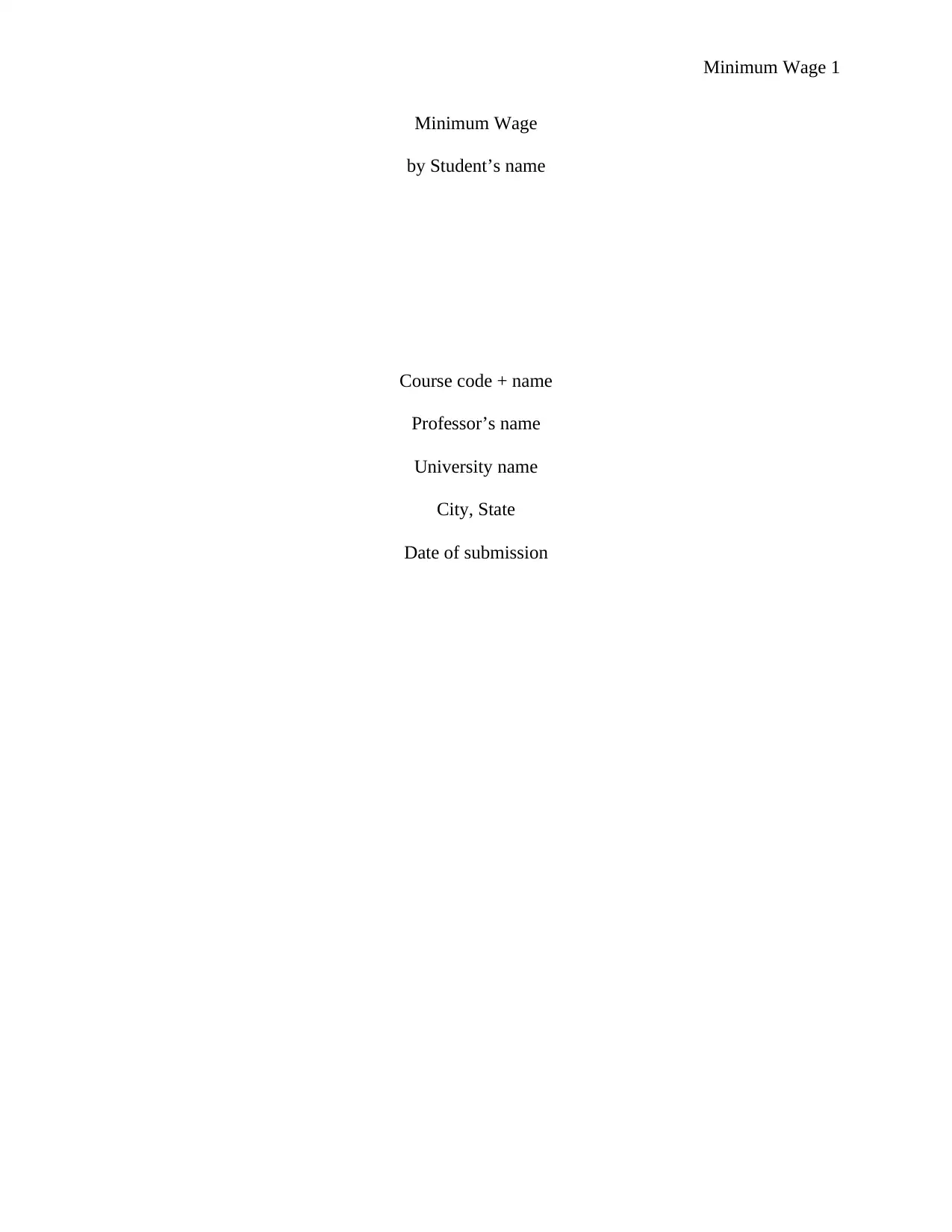
Minimum Wage 1
Minimum Wage
by Student’s name
Course code + name
Professor’s name
University name
City, State
Date of submission
Minimum Wage
by Student’s name
Course code + name
Professor’s name
University name
City, State
Date of submission
Paraphrase This Document
Need a fresh take? Get an instant paraphrase of this document with our AI Paraphraser
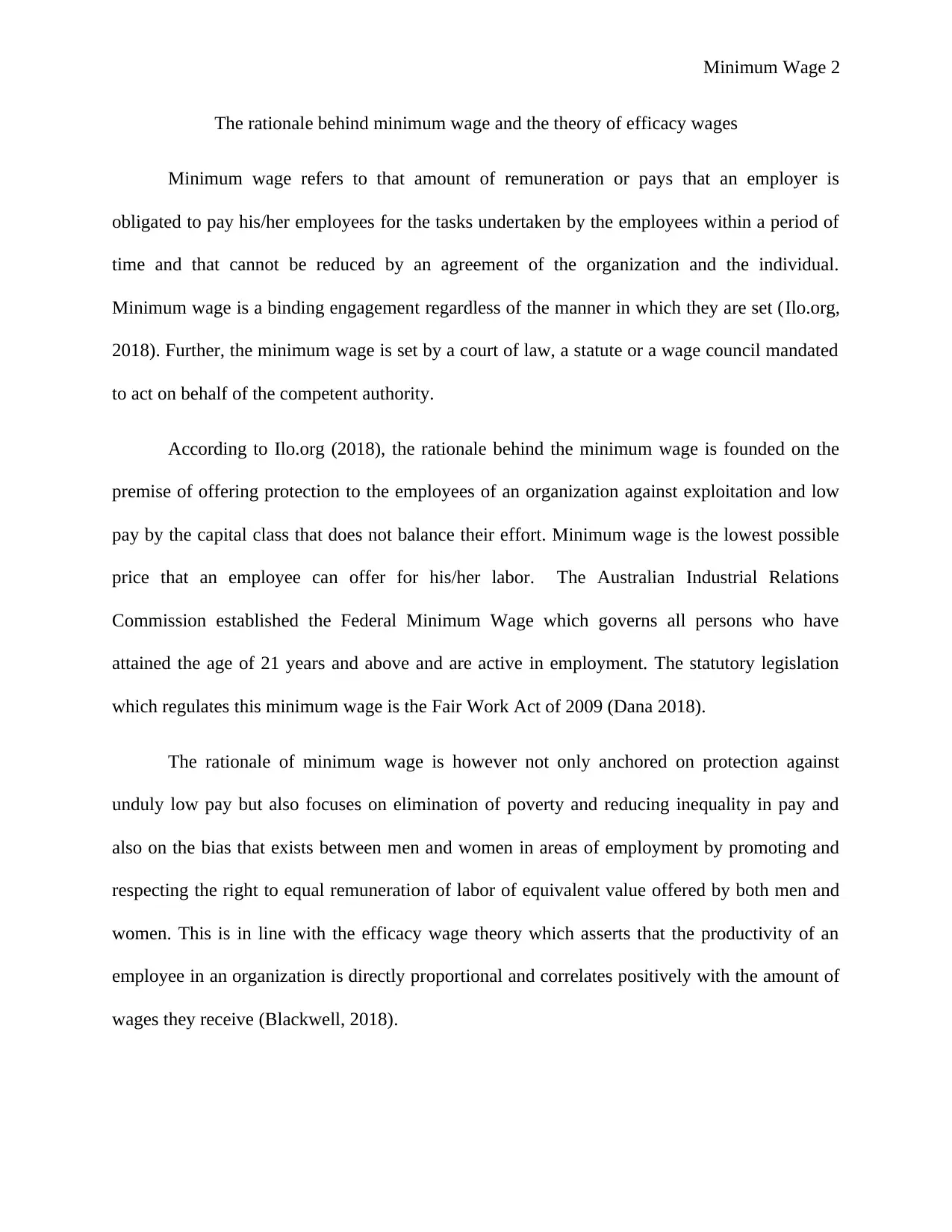
Minimum Wage 2
The rationale behind minimum wage and the theory of efficacy wages
Minimum wage refers to that amount of remuneration or pays that an employer is
obligated to pay his/her employees for the tasks undertaken by the employees within a period of
time and that cannot be reduced by an agreement of the organization and the individual.
Minimum wage is a binding engagement regardless of the manner in which they are set (Ilo.org,
2018). Further, the minimum wage is set by a court of law, a statute or a wage council mandated
to act on behalf of the competent authority.
According to Ilo.org (2018), the rationale behind the minimum wage is founded on the
premise of offering protection to the employees of an organization against exploitation and low
pay by the capital class that does not balance their effort. Minimum wage is the lowest possible
price that an employee can offer for his/her labor. The Australian Industrial Relations
Commission established the Federal Minimum Wage which governs all persons who have
attained the age of 21 years and above and are active in employment. The statutory legislation
which regulates this minimum wage is the Fair Work Act of 2009 (Dana 2018).
The rationale of minimum wage is however not only anchored on protection against
unduly low pay but also focuses on elimination of poverty and reducing inequality in pay and
also on the bias that exists between men and women in areas of employment by promoting and
respecting the right to equal remuneration of labor of equivalent value offered by both men and
women. This is in line with the efficacy wage theory which asserts that the productivity of an
employee in an organization is directly proportional and correlates positively with the amount of
wages they receive (Blackwell, 2018).
The rationale behind minimum wage and the theory of efficacy wages
Minimum wage refers to that amount of remuneration or pays that an employer is
obligated to pay his/her employees for the tasks undertaken by the employees within a period of
time and that cannot be reduced by an agreement of the organization and the individual.
Minimum wage is a binding engagement regardless of the manner in which they are set (Ilo.org,
2018). Further, the minimum wage is set by a court of law, a statute or a wage council mandated
to act on behalf of the competent authority.
According to Ilo.org (2018), the rationale behind the minimum wage is founded on the
premise of offering protection to the employees of an organization against exploitation and low
pay by the capital class that does not balance their effort. Minimum wage is the lowest possible
price that an employee can offer for his/her labor. The Australian Industrial Relations
Commission established the Federal Minimum Wage which governs all persons who have
attained the age of 21 years and above and are active in employment. The statutory legislation
which regulates this minimum wage is the Fair Work Act of 2009 (Dana 2018).
The rationale of minimum wage is however not only anchored on protection against
unduly low pay but also focuses on elimination of poverty and reducing inequality in pay and
also on the bias that exists between men and women in areas of employment by promoting and
respecting the right to equal remuneration of labor of equivalent value offered by both men and
women. This is in line with the efficacy wage theory which asserts that the productivity of an
employee in an organization is directly proportional and correlates positively with the amount of
wages they receive (Blackwell, 2018).
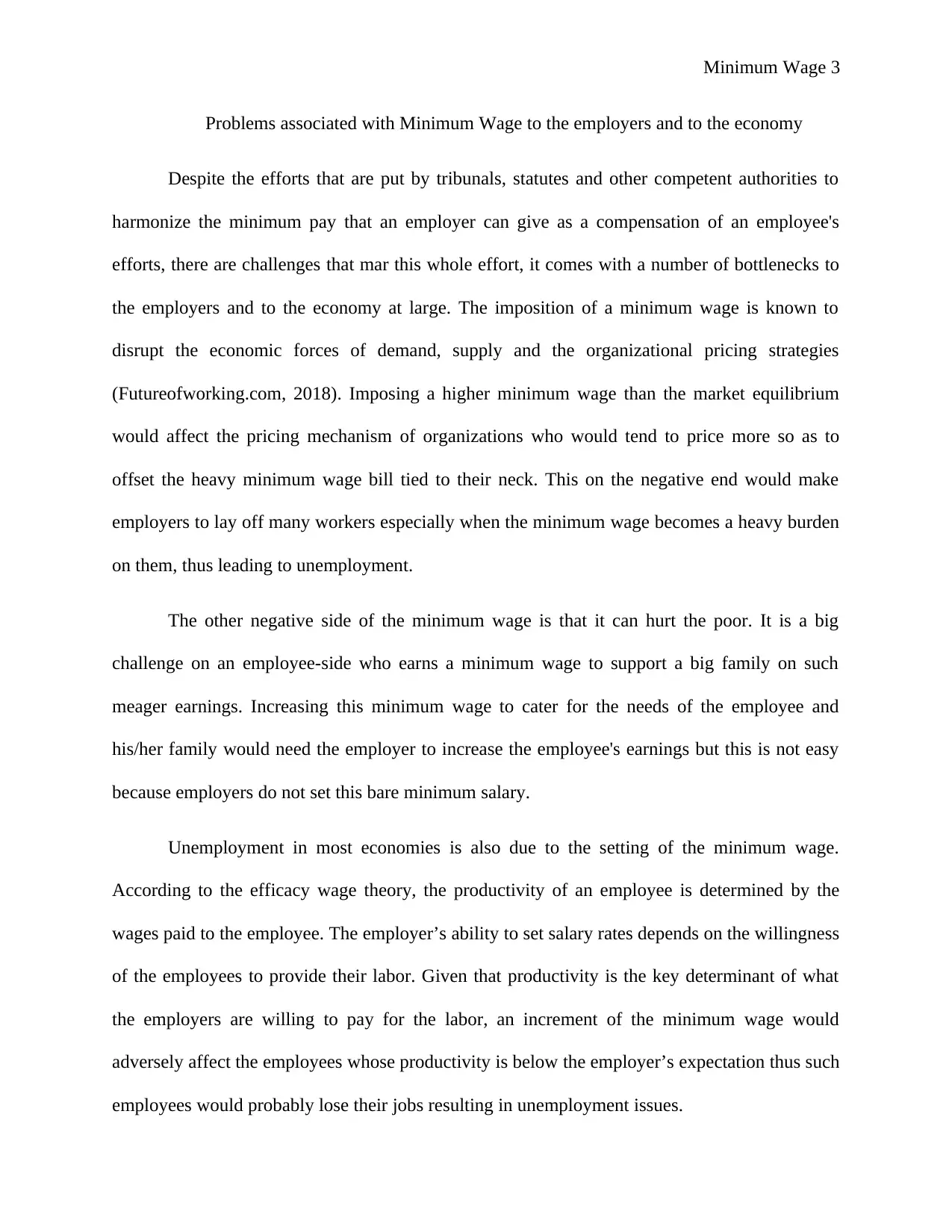
Minimum Wage 3
Problems associated with Minimum Wage to the employers and to the economy
Despite the efforts that are put by tribunals, statutes and other competent authorities to
harmonize the minimum pay that an employer can give as a compensation of an employee's
efforts, there are challenges that mar this whole effort, it comes with a number of bottlenecks to
the employers and to the economy at large. The imposition of a minimum wage is known to
disrupt the economic forces of demand, supply and the organizational pricing strategies
(Futureofworking.com, 2018). Imposing a higher minimum wage than the market equilibrium
would affect the pricing mechanism of organizations who would tend to price more so as to
offset the heavy minimum wage bill tied to their neck. This on the negative end would make
employers to lay off many workers especially when the minimum wage becomes a heavy burden
on them, thus leading to unemployment.
The other negative side of the minimum wage is that it can hurt the poor. It is a big
challenge on an employee-side who earns a minimum wage to support a big family on such
meager earnings. Increasing this minimum wage to cater for the needs of the employee and
his/her family would need the employer to increase the employee's earnings but this is not easy
because employers do not set this bare minimum salary.
Unemployment in most economies is also due to the setting of the minimum wage.
According to the efficacy wage theory, the productivity of an employee is determined by the
wages paid to the employee. The employer’s ability to set salary rates depends on the willingness
of the employees to provide their labor. Given that productivity is the key determinant of what
the employers are willing to pay for the labor, an increment of the minimum wage would
adversely affect the employees whose productivity is below the employer’s expectation thus such
employees would probably lose their jobs resulting in unemployment issues.
Problems associated with Minimum Wage to the employers and to the economy
Despite the efforts that are put by tribunals, statutes and other competent authorities to
harmonize the minimum pay that an employer can give as a compensation of an employee's
efforts, there are challenges that mar this whole effort, it comes with a number of bottlenecks to
the employers and to the economy at large. The imposition of a minimum wage is known to
disrupt the economic forces of demand, supply and the organizational pricing strategies
(Futureofworking.com, 2018). Imposing a higher minimum wage than the market equilibrium
would affect the pricing mechanism of organizations who would tend to price more so as to
offset the heavy minimum wage bill tied to their neck. This on the negative end would make
employers to lay off many workers especially when the minimum wage becomes a heavy burden
on them, thus leading to unemployment.
The other negative side of the minimum wage is that it can hurt the poor. It is a big
challenge on an employee-side who earns a minimum wage to support a big family on such
meager earnings. Increasing this minimum wage to cater for the needs of the employee and
his/her family would need the employer to increase the employee's earnings but this is not easy
because employers do not set this bare minimum salary.
Unemployment in most economies is also due to the setting of the minimum wage.
According to the efficacy wage theory, the productivity of an employee is determined by the
wages paid to the employee. The employer’s ability to set salary rates depends on the willingness
of the employees to provide their labor. Given that productivity is the key determinant of what
the employers are willing to pay for the labor, an increment of the minimum wage would
adversely affect the employees whose productivity is below the employer’s expectation thus such
employees would probably lose their jobs resulting in unemployment issues.
⊘ This is a preview!⊘
Do you want full access?
Subscribe today to unlock all pages.

Trusted by 1+ million students worldwide
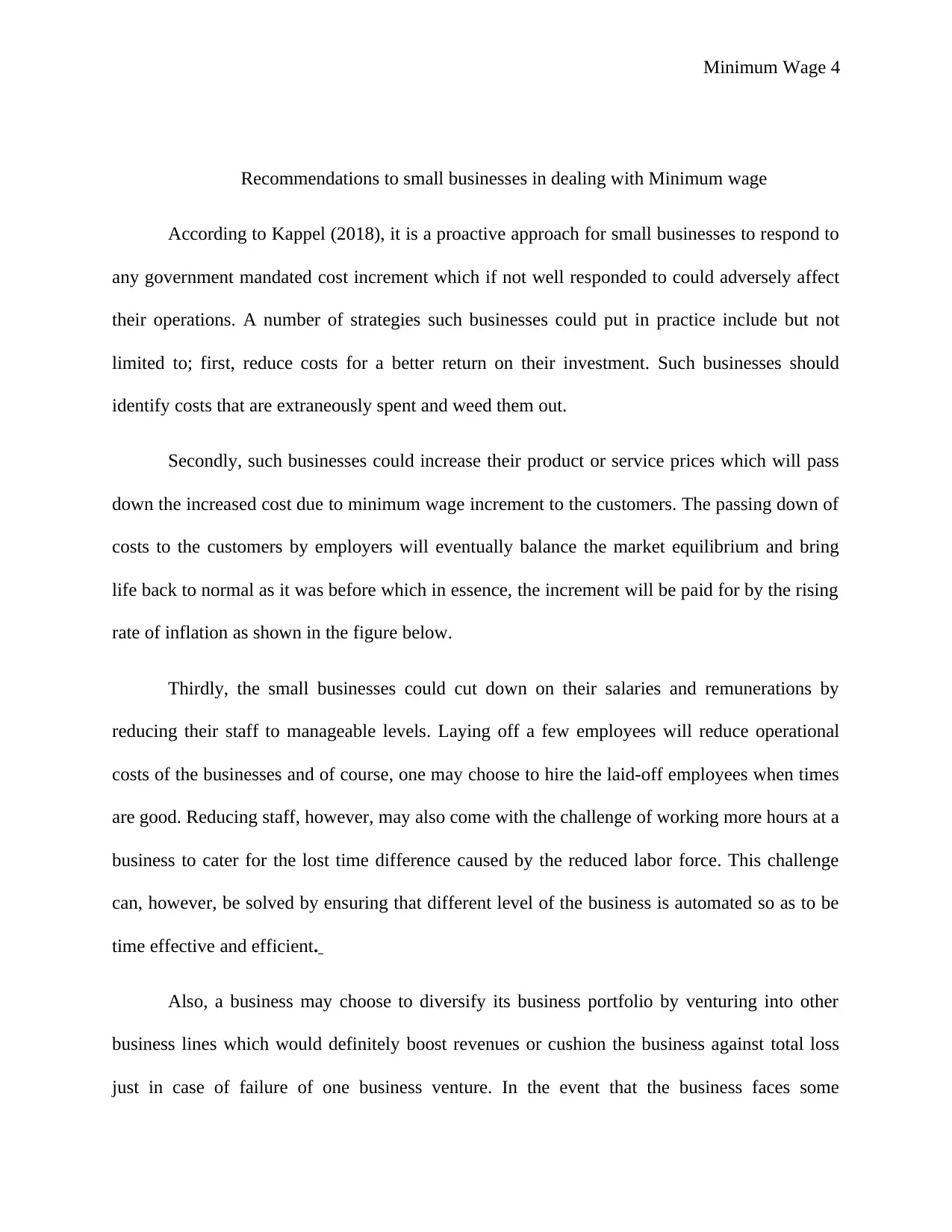
Minimum Wage 4
Recommendations to small businesses in dealing with Minimum wage
According to Kappel (2018), it is a proactive approach for small businesses to respond to
any government mandated cost increment which if not well responded to could adversely affect
their operations. A number of strategies such businesses could put in practice include but not
limited to; first, reduce costs for a better return on their investment. Such businesses should
identify costs that are extraneously spent and weed them out.
Secondly, such businesses could increase their product or service prices which will pass
down the increased cost due to minimum wage increment to the customers. The passing down of
costs to the customers by employers will eventually balance the market equilibrium and bring
life back to normal as it was before which in essence, the increment will be paid for by the rising
rate of inflation as shown in the figure below.
Thirdly, the small businesses could cut down on their salaries and remunerations by
reducing their staff to manageable levels. Laying off a few employees will reduce operational
costs of the businesses and of course, one may choose to hire the laid-off employees when times
are good. Reducing staff, however, may also come with the challenge of working more hours at a
business to cater for the lost time difference caused by the reduced labor force. This challenge
can, however, be solved by ensuring that different level of the business is automated so as to be
time effective and efficient.
Also, a business may choose to diversify its business portfolio by venturing into other
business lines which would definitely boost revenues or cushion the business against total loss
just in case of failure of one business venture. In the event that the business faces some
Recommendations to small businesses in dealing with Minimum wage
According to Kappel (2018), it is a proactive approach for small businesses to respond to
any government mandated cost increment which if not well responded to could adversely affect
their operations. A number of strategies such businesses could put in practice include but not
limited to; first, reduce costs for a better return on their investment. Such businesses should
identify costs that are extraneously spent and weed them out.
Secondly, such businesses could increase their product or service prices which will pass
down the increased cost due to minimum wage increment to the customers. The passing down of
costs to the customers by employers will eventually balance the market equilibrium and bring
life back to normal as it was before which in essence, the increment will be paid for by the rising
rate of inflation as shown in the figure below.
Thirdly, the small businesses could cut down on their salaries and remunerations by
reducing their staff to manageable levels. Laying off a few employees will reduce operational
costs of the businesses and of course, one may choose to hire the laid-off employees when times
are good. Reducing staff, however, may also come with the challenge of working more hours at a
business to cater for the lost time difference caused by the reduced labor force. This challenge
can, however, be solved by ensuring that different level of the business is automated so as to be
time effective and efficient.
Also, a business may choose to diversify its business portfolio by venturing into other
business lines which would definitely boost revenues or cushion the business against total loss
just in case of failure of one business venture. In the event that the business faces some
Paraphrase This Document
Need a fresh take? Get an instant paraphrase of this document with our AI Paraphraser
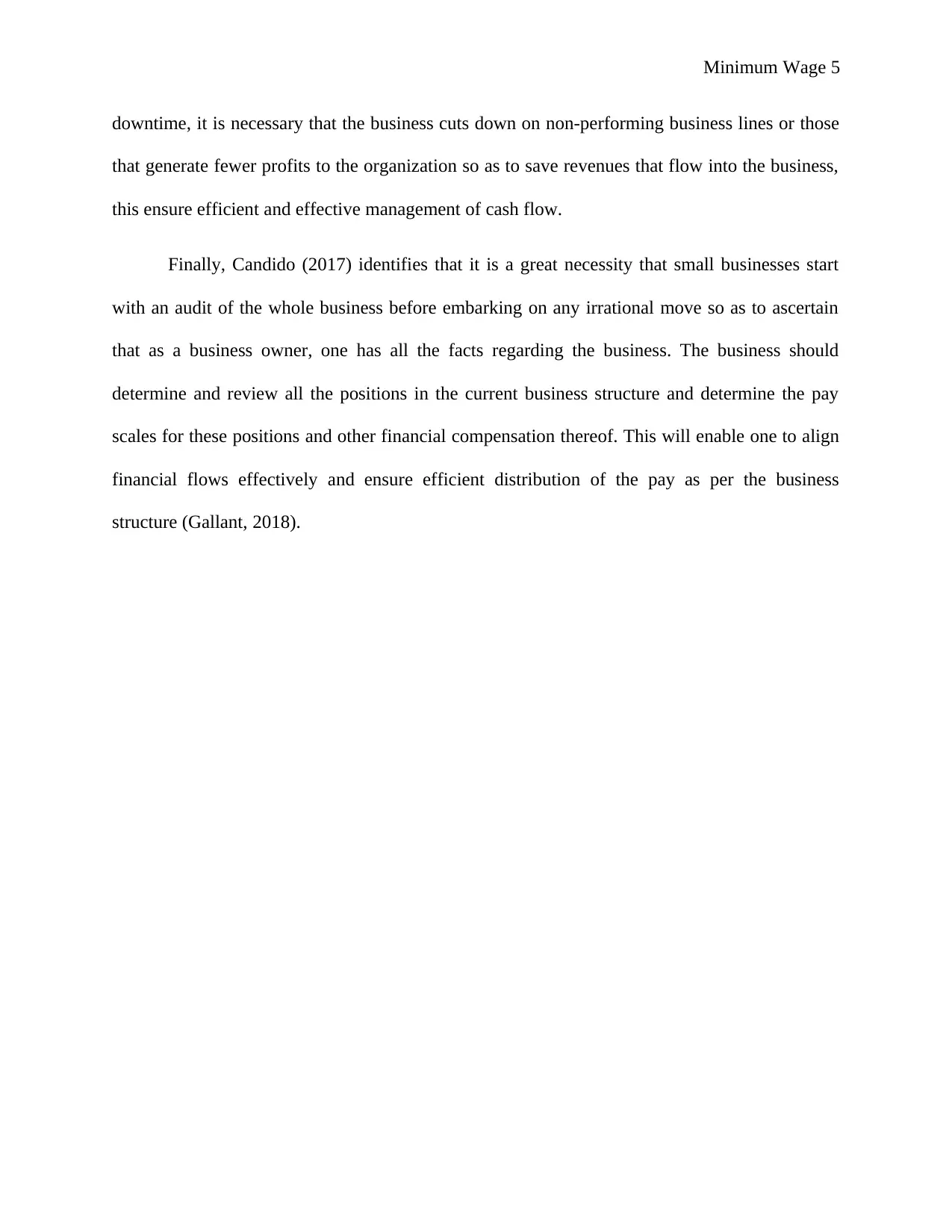
Minimum Wage 5
downtime, it is necessary that the business cuts down on non-performing business lines or those
that generate fewer profits to the organization so as to save revenues that flow into the business,
this ensure efficient and effective management of cash flow.
Finally, Candido (2017) identifies that it is a great necessity that small businesses start
with an audit of the whole business before embarking on any irrational move so as to ascertain
that as a business owner, one has all the facts regarding the business. The business should
determine and review all the positions in the current business structure and determine the pay
scales for these positions and other financial compensation thereof. This will enable one to align
financial flows effectively and ensure efficient distribution of the pay as per the business
structure (Gallant, 2018).
downtime, it is necessary that the business cuts down on non-performing business lines or those
that generate fewer profits to the organization so as to save revenues that flow into the business,
this ensure efficient and effective management of cash flow.
Finally, Candido (2017) identifies that it is a great necessity that small businesses start
with an audit of the whole business before embarking on any irrational move so as to ascertain
that as a business owner, one has all the facts regarding the business. The business should
determine and review all the positions in the current business structure and determine the pay
scales for these positions and other financial compensation thereof. This will enable one to align
financial flows effectively and ensure efficient distribution of the pay as per the business
structure (Gallant, 2018).
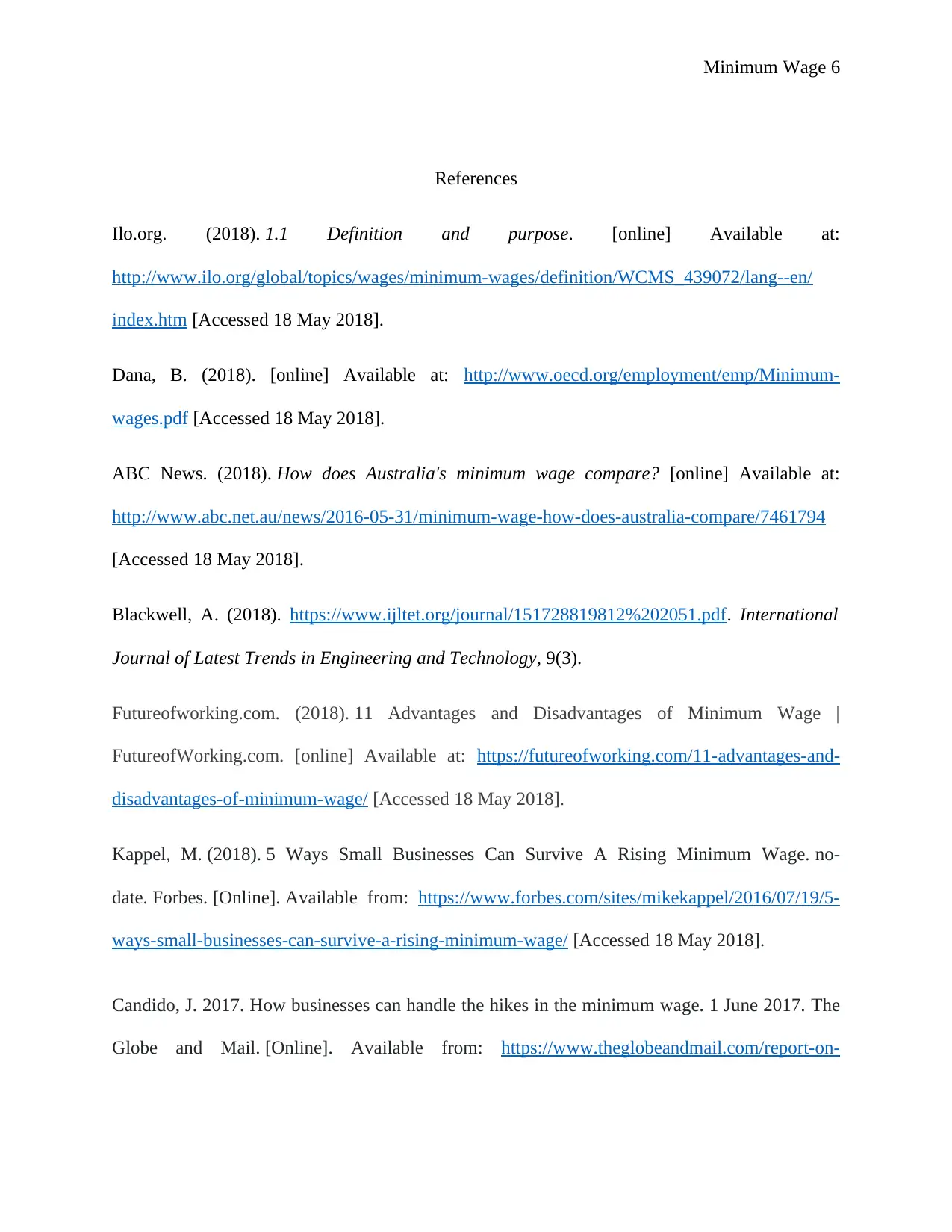
Minimum Wage 6
References
Ilo.org. (2018). 1.1 Definition and purpose. [online] Available at:
http://www.ilo.org/global/topics/wages/minimum-wages/definition/WCMS_439072/lang--en/
index.htm [Accessed 18 May 2018].
Dana, B. (2018). [online] Available at: http://www.oecd.org/employment/emp/Minimum-
wages.pdf [Accessed 18 May 2018].
ABC News. (2018). How does Australia's minimum wage compare? [online] Available at:
http://www.abc.net.au/news/2016-05-31/minimum-wage-how-does-australia-compare/7461794
[Accessed 18 May 2018].
Blackwell, A. (2018). https://www.ijltet.org/journal/151728819812%202051.pdf. International
Journal of Latest Trends in Engineering and Technology, 9(3).
Futureofworking.com. (2018). 11 Advantages and Disadvantages of Minimum Wage |
FutureofWorking.com. [online] Available at: https://futureofworking.com/11-advantages-and-
disadvantages-of-minimum-wage/ [Accessed 18 May 2018].
Kappel, M. (2018). 5 Ways Small Businesses Can Survive A Rising Minimum Wage. no-
date. Forbes. [Online]. Available from: https://www.forbes.com/sites/mikekappel/2016/07/19/5-
ways-small-businesses-can-survive-a-rising-minimum-wage/ [Accessed 18 May 2018].
Candido, J. 2017. How businesses can handle the hikes in the minimum wage. 1 June 2017. The
Globe and Mail. [Online]. Available from: https://www.theglobeandmail.com/report-on-
References
Ilo.org. (2018). 1.1 Definition and purpose. [online] Available at:
http://www.ilo.org/global/topics/wages/minimum-wages/definition/WCMS_439072/lang--en/
index.htm [Accessed 18 May 2018].
Dana, B. (2018). [online] Available at: http://www.oecd.org/employment/emp/Minimum-
wages.pdf [Accessed 18 May 2018].
ABC News. (2018). How does Australia's minimum wage compare? [online] Available at:
http://www.abc.net.au/news/2016-05-31/minimum-wage-how-does-australia-compare/7461794
[Accessed 18 May 2018].
Blackwell, A. (2018). https://www.ijltet.org/journal/151728819812%202051.pdf. International
Journal of Latest Trends in Engineering and Technology, 9(3).
Futureofworking.com. (2018). 11 Advantages and Disadvantages of Minimum Wage |
FutureofWorking.com. [online] Available at: https://futureofworking.com/11-advantages-and-
disadvantages-of-minimum-wage/ [Accessed 18 May 2018].
Kappel, M. (2018). 5 Ways Small Businesses Can Survive A Rising Minimum Wage. no-
date. Forbes. [Online]. Available from: https://www.forbes.com/sites/mikekappel/2016/07/19/5-
ways-small-businesses-can-survive-a-rising-minimum-wage/ [Accessed 18 May 2018].
Candido, J. 2017. How businesses can handle the hikes in the minimum wage. 1 June 2017. The
Globe and Mail. [Online]. Available from: https://www.theglobeandmail.com/report-on-
⊘ This is a preview!⊘
Do you want full access?
Subscribe today to unlock all pages.

Trusted by 1+ million students worldwide
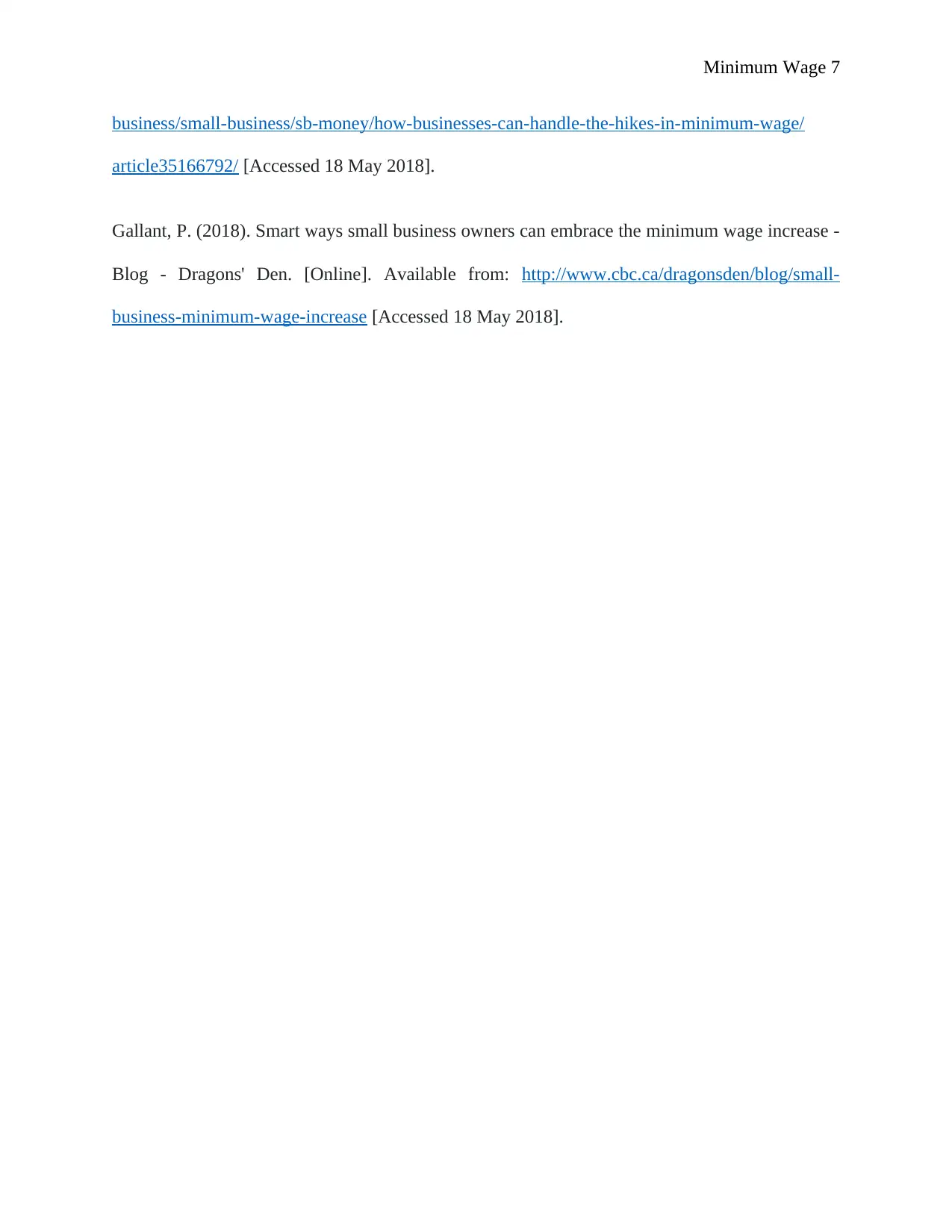
Minimum Wage 7
business/small-business/sb-money/how-businesses-can-handle-the-hikes-in-minimum-wage/
article35166792/ [Accessed 18 May 2018].
Gallant, P. (2018). Smart ways small business owners can embrace the minimum wage increase -
Blog - Dragons' Den. [Online]. Available from: http://www.cbc.ca/dragonsden/blog/small-
business-minimum-wage-increase [Accessed 18 May 2018].
business/small-business/sb-money/how-businesses-can-handle-the-hikes-in-minimum-wage/
article35166792/ [Accessed 18 May 2018].
Gallant, P. (2018). Smart ways small business owners can embrace the minimum wage increase -
Blog - Dragons' Den. [Online]. Available from: http://www.cbc.ca/dragonsden/blog/small-
business-minimum-wage-increase [Accessed 18 May 2018].
1 out of 7
Your All-in-One AI-Powered Toolkit for Academic Success.
+13062052269
info@desklib.com
Available 24*7 on WhatsApp / Email
![[object Object]](/_next/static/media/star-bottom.7253800d.svg)
Unlock your academic potential
Copyright © 2020–2026 A2Z Services. All Rights Reserved. Developed and managed by ZUCOL.


